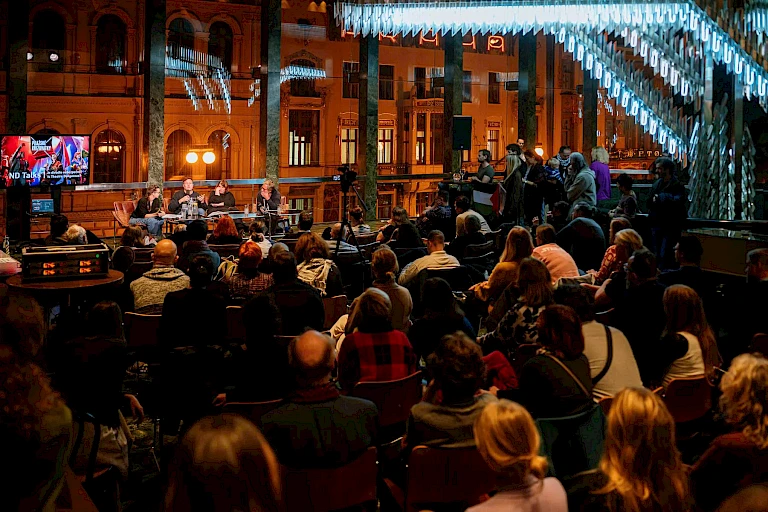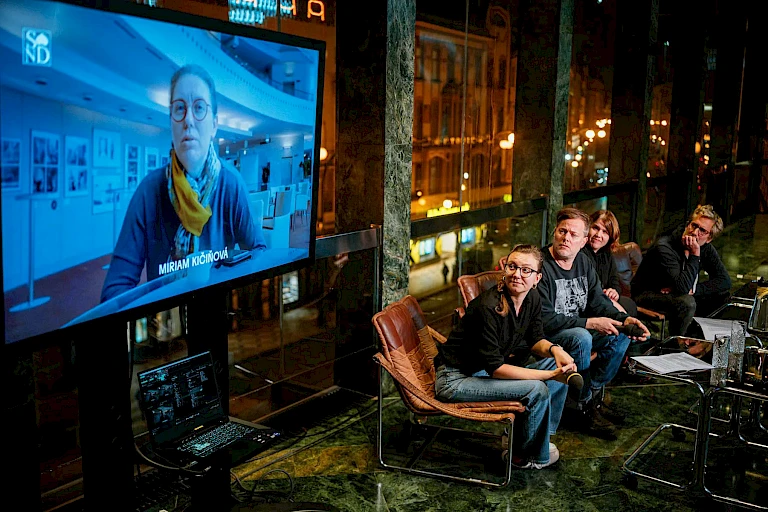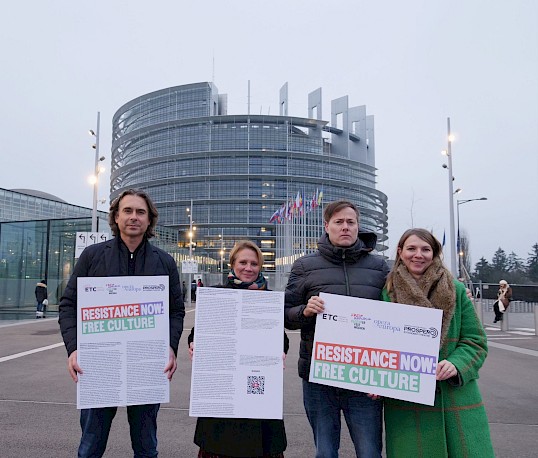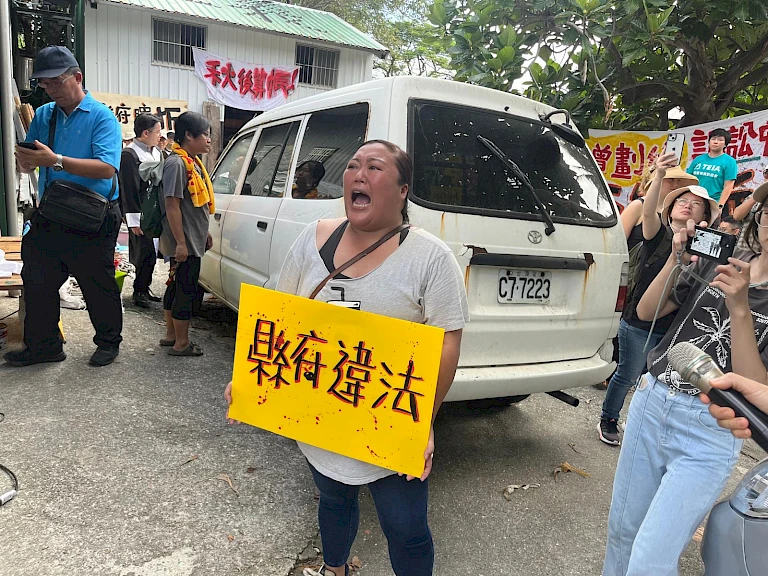“We live in a globalised world, but we have no idea what is happening in this shared space,” says Milo Rau
The Prague Crossroads Festival, organised by the National Theatre in Prague, hosted Milo Rau personally and his discussion project, RESISTANCE NOW! Tour at the New Stage in November. As the new director of the Vienna Festival (Wiener Festwochen) | Free Republic of Vienna, he created this internationally travelling platform to connect institutional representatives, artists and activists in a situation where European culture faces increasingly strong politically motivated attacks. Alongside the Czech representative Jiří Havelka, Hungarian artist Dóra Büki, the executive director of the independent theatre Proton, whose theatre has found itself virtually without funds as a result of the policies of the ruling Fidesz party, took part in it. Miriam Kičiňová, the artistic director of the Slovak National Theatre Drama Department, joined online.
The festival brought the latest production of this director, Medea's Children, to Prague as well. Since my appointment with the director took place before I saw the performance of Medea's Children and the social climate was very tense – the distressing environment of contemporary Slovakian and Hungarian culture touches us all – I decided to devote the interview to a single topic: democracy and its failures. Milo Rau and I met at the New Stage for the following interview before the discussion started. Both of us were sleep-deprived, as we had gotten up to watch live the vote counting of the US presidential election. I trusted this artist to reflect in an inspiring way on the topic related to democracy and its failures, as in 2015, when one of his documentary theatre pieces changed my life.
I saw his Hate Radio at the Divadelná Nitra festival in Slovakia, a production he directed about the genocide in Rwanda. The theme of the work was the inaction and silence of the world powers on the massacres that took place between 7 April and 15 July 1994. It wasn't about the information about the genocide - which I mostly had - but about how the hyper-realistic performance presented it. The artists managed to create a perfectly mundane and unobtrusive image of a killing that takes place creepily in a world where everything seemingly makes sense. I believe this remains still very actual. Czech audiences have had several opportunities to see his work in the past, Compassion: The History of the Machine Gun or Five Easy Pieces in the former Archa Theatre in Prague or Familie at Pilsen's DIVADLO International Theatre Festival.

The topic of democracy is strongly linked to your person for me; I have the feeling that you, as a creator, have cared about it for a long time. In some of your essays, you say, “Theatre is democracy in small”. So, I wanted to ask you whether your relationship with the concept of democracy has evolved over time. For example, in the Czech Republic, many people are not very enthusiastic about the concept of democracy itself anymore. Not everyone sees an advantage in it. I also think artists have started being careful about speaking about this topic because nowadays, it is not automatic that everybody agrees with you when you call for a more vigorous democracy.
Perhaps a very good beginning to answer these questions is what happened in the U.S. today. And, of course, in the last weeks, months, years and two generations. On the one hand, we became too safe about the concept of democracy – that it existed forever and will survive everything. We can do what we want with it. We can make it a tool of lobbying. We can make it a tool of media hysteria, etc. And I think slowly, we destroyed it. Now I have the impression – looking at Hungary, Slovakia, Austria too, the U.S., looking at Brazil, and countries I know very well – that it seems that democracy became kind of a historic prologue of dictatorship. It's just a kind of road to take the power and not give it away again because it's an easy way. You find a majority by telling whatever you want because it's all fake news anyway, nobody believes anything. When you have the power, you try to stay and abolish the institutions, which happens in more countries.
When you look at history now, it is always a historic prologue of dictatorship. It was in Rome, in France, I mean the French Revolution, the Roman Republic, and democracy in Greece. It was always the same story. We have one, two, and three generations, and then it slowly ends. In France, it ended after three years and then you had la Terreur, you had King Napoleon, and then the Restoration. So, we should be aware that this is a concept that has now been disappearing for some generations. And perhaps, it will come back in three or thirty years or three hundred years or never come back. We don't know. Perhaps we will find out that it was a concept linked to a certain civilization, which is the capitalist civilization, and that in another civilization which we are now shifting into, it will not exist anymore. We should really understand from, let's say, Marx's point of view, that what for us, in the way we produce things, opinions, how we connect relations, and how we talk to others, that everyone’s opinion is super important. We have a kind of independent space in our heads. And this is the democratic space.
Do you believe that democracy is somehow inherent in European identity?
My family came from Italy and Germany to Switzerland during fascism because of economic reasons for the Italian part and Nazi reasons because they were Jewish from the German side, and they met in Switzerland. My mother was born there in 1950. The right to vote for women in Switzerland was introduced in 1971. That means my mother, who is in her 70s now, couldn't vote for three years. Democracy didn't exist for her. I mean, what the hell are we talking about? This is a story that is so recent. And that's why I'm always a bit afraid when people say, “but will democracy disappear now?” We just grabbed it. And we just opened our arms again, and it will disappear like the ghost of Hamlet's father. Who is talking? We don't know.

Lately, you have been interpreting ancient Greek tragedies (Orestes in Mosul, Antigone in the Amazon, Medea’s Children). In your work, you seem to look at the roots of European culture….
I get bored quite fast, so I always change the approach I have – that’s why I work in trilogies so that I can always try out the form in three steps. But Medea’s Children is a satirical play. For ancient tragedies, I did Orestes in Mosul, then I did the movie New Gospel and then I did Antigone in the Amazon. And then I had the impression that I needed one step more and I did Medea. But actually, this is a kind of a complex box about, let's say, re-contextualization of tragedies. Sometimes people are asking, but why do we still play these tragedies, these canonical things? And I answer, we will not understand these texts anymore when we shift into another civilization. But we are still in the same civilization as Euripides. And it's at the same time, of course, sad. But it's also how it is. It's really 2500 years since the tragedy was invented until today.
We don't even need to be religious anymore to meet the Bible as a revolutionary book. When I did the movie about the Bible, people didn't know whether it was a documentary movie and when it was fiction, let's say the Bible. We live in the same empire because the words are still the same. The sentences of Jesus are liberated again. The problem was that the church was appropriating them, but now the church has disappeared; it's not so valuable anymore, and the words themselves can talk to us again in their social-revolutionary sense. And I hope for a day that we will not understand the Bible anymore because that will mean we have been liberated from something. Until then, the book might have been talking to us for centuries.
And it's only an example; I could say this about many other books, for example, ancient Greek tragedies. They were made when this society we are still living in, let's say, the extractive society, where we became distant from the gods, where we understood that we would just die. And some people would grieve, and then they would die too, and then we would be forgotten, and that's it. So eternity didn't exist anymore. Then, they started to write these texts. Still, of the thirty-two tragedies, ten are staged all the time, and twenty are not staged at all. They are not staged because we don't understand them anymore. They don't talk to us anymore. This is very natural, but it's also very natural that other texts don't stop talking to us. And at one point, they will.
That might be true for reading, but nowadays, in theatre, I rarely see interpretations of ancient Greek tragedies that would genuinely talk to contemporary audiences, no matter how much the artists rewrite the texts to make them actual. On the contrary, staging ancient Greek tragedies is often seen as the colonial practice of sticking to a well-established cultural canon. I have noticed that your piece Antigone in the Amazon has been criticized several times from this point of view.
Concerning Antigone in the Amazon, I was touring in Brazil with some other plays when the ex-president Bolsonaro was still in his office, and we got blocked with the plays and needed help to leave Sao Paulo. And then a Brazilian dramaturge came to me and told me: “Milo, I saw your play, I know you can't tour anymore, but do you want to work with us on the Landless Movement?” I said, “Yes of course,” because it was the biggest social movement on the planet. And then, we started thinking about how to stage the massacre of nineteen farmers which happened in 1996 on the Transamazônica highway. My colleagues came up with the idea that Antigone would fit perfectly. And I said: ‘Guys, I somehow agree. I never staged Antigone, but we can do that if you want.’ And then we rewrote Antigone together, we staged it on a closed street through the Transamazônica, and we performed the premiere on the day of the massacre. Then we also started with a European version of it and started touring here. And all the authorship money that we make, 200,000 euros already, goes directly to the Landless Movement, to their fight in the Amazon. So, I think for me, it's a kind of a model of using the art institution somehow to connect or create what I call global realism, to connect solidarity between two places interconnected by colonization, world economy, and traditions.
Do you sometimes feel the need to be careful about the European gaze you might impose when collaborating with non-European artists? Is this concern even relevant to you?
The European gaze is a complete fake. The idea of Europe was constructed as if it were just one city somewhere. I mean, Europa was a stolen princess from North Africa... Perhaps Europe started to exist as a concept in the 16th and 17th centuries. Then you had this kind of new toxic and absurd myth, which was Europe, and which is on the basis of colonization. And when I say Europe, of course, I mean the concept. I don't mean the Czechs or the Germans or whatever. I mean a concept of, let's say, progress, exploitation, and liberation are linked. This is the big problem with the story that we are telling.
We come back to democracy. Because democracy is a beautiful thing, but it's based on a whole toxic and dark sea of exploitation. It's the last outcome of this really suicidal civilization we are part of. Democracy is suicidal. It's just a model of – when you look at the Greek tragedies – they are discussing, and when they lose this discussion, they are killed in the end. You know, this was Greek democracy. When you lose a discussion, I mean you had a lot of examples of people who had to leave the city. Because if not, they would be killed.

When we were talking about Europe and its problems and fakeness, I remember reading one of your ideas in the text published on the web page of the National Theatre now. It was your lecture for the ITI Congress. There, you said that you think that in Europe, there are two competing "perpetrator traumas", the one of the Holocaust and the one of colonialism. So, I find it an interesting opinion because it's a very tough topic for us, and there is a conflict between these two traumas. After all, Czech society needs to be faster to discuss this topic. So, if you could say more about your attitude to this problem, I would like to ask you.
For me, it's very much based on the fact that I was living in the Atlantic space in Belgium and France, and then I became artistic director of the Vienna Festival, so I came to Central Europe. And because I was leading a theatre in Belgium and a festival in Vienna at the same time, I often went from one to the other during the same week. And in Vienna, you had the Israeli flags everywhere. And then I went to Belgium, and you had the Palestine flags everywhere. At one point, I was asking myself how it could be. The problem is, of course, not that you are for Israel or you are for Palestine; that's a deeply tragic story that there are two people on the same land, and one is now a military, as we know, state that is destroying or using the chance somehow to destroy the other one.
So, after the 7th October massacre, we see a massacre going on, and we all know that. But in one part of Europe, you can't overcome the fact that we decided after the Second World War, because we tried to kill everybody who was Jewish (including my family, by the way), that it would never happen again. And we will do whatever we can to ensure that it will not happen again. Now, we think that our guilt can disappear by supporting any political actions from the State of Israel when we allow other people to be killed. And this is not the solution, it's rather very tragic. This is the circle of violence that we know from the Oresteia.
And then you go to Belgium, and they read this conflict as a colonialist conflict of a suppressed people, which are the Palestinians, and which is not true at all because the Jews were there all the time. They never disappeared. It's not true that the Palestinians had a kind of a state there. I mean, it's true and untrue.
Why do you call it a perpetrator trauma on the other side of the Rhine?
Why are they looking like this at the Palestinians? They don't have anything to do with them, but they were colonizing the Congo and North Africa, etc. and they killed millions of people there. So, they said we would not allow the Israeli state to kill other people because we killed the people. That brings us to the fact that, as Europeans, it's like there's a football match, and we stay on the sideline. We don't help anybody, but we fight each other. And it does really not help the Palestinian people, and it does not help the Israeli state. It just makes it worse even faster. What we should do is send the UN, and we should stop the conflict. We should just decide now the blue helmets to go there, and they just stop everything. Then, we find the solution as a world community. However, as we take sides because of history, the conflict continues. And that's really a tragic conflict.
You have just said, “We should stop the conflict”. Do you believe it is possible for “us” to stop it?
I think, concerning the Palestinians, or let's say Gaza (because Palestinians are not just in Gaza), I believe the massacre there is almost finished, and they will finish it. I think that this kind of military state has taken over Israel. I have so many friends in Israel, and they are all in opposition, and there are big demonstrations against the government – if we had a government like this, I would also demonstrate, as they demonstrate. The people demonstrating express that they don't like the politics. They don't like to see civilians being killed. Of course, they are afraid, traumatised, etc. But I think this has gone too far now and will not stop. It will end in a disaster because fifty thousand people have died there (according to The Gaza Ministry of Health ed. note). We will look back in two or three years and ask ourselves: How could it happen?
Let’s connect this democracy topic and the theatre topic. The reason you are in Prague is to take part in the RESISTANCE NOW! Tour, I wanted to ask you how theatre can enforce political resistance.
For me, the RESISTANCE NOW! Tour started when, in Vienna, I read in the newspaper that the Slovakian Culture Minister dismissed the General Director of the Slovak National Theatre. So I was like, what happened? And hardly anyone in Vienna was reacting to it because it was in Slovakia. But Bratislava, as you know, is almost the same city as Vienna - we share the same airport. It's just like, again, the same story with the two perpetrator traumas. I was like, okay, it's happening there. Nobody is reacting. So, we are really not connected in Europe. Europe does not exist.
We want to run until the European Parliament to force them to look closely into the politics of culture of the different member states. For example, Slovakia. For instance, Hungary or some people who are appealing to become member states, like Serbia. And so, that's what should be done. It's up to us, the civic society. I would not even say theatre. We are really citizens. It's up to us to create a transnational system of solidarity, because it does not exist.
Could you elaborate on this?
When I opened the Bitef Festival in Belgrade, they told me: ‘Chancellor Schultz from Germany was here; they opened a big lithium mine for Volkswagen. They pushed twenty thousand families from the land, and the European Union subsidised it because the German car industry needed lithium for electric cars.’ And I thought that's interesting because it's the biggest mining project in European history and done for the German car industry. There is nothing in the media in Germany. Nobody knows about it. I was telling German people, they were saying: "What are you talking about? We have never heard about it." So, we live in a globalised space, but at the same time, we have no idea what is happening in this shared space.
What I understood by travelling every day from the perpetrator trauma of colonialism to the perpetrator trauma of the Holocaust, back and forth, is that we are not linked at all. I'm not talking about Africa and Europe. I'm talking about the Rhine. If I would hang a Palestinian flag outside, let's say, a theatre in Vienna, the police would come, and perhaps some crazy people would burn down the theatre. And if I would hang, for example, the Israeli flag outside our theatre in Belgium (Milo Rau is a former director of NT Gent ed. note), they would burn it down immediately. How can it be, you know?
So, the RESISTANCE NOW! Tour is meant to be your way to overcome the gaps you have mentioned in this interview?
I was in Taiwan two weeks ago at the National Theatre. I discussed this with an indigenous philosopher, and he said: “You know what's funny? When they lost the civil war in China, Chiang Kai-shek and his whole army invaded the island of Taiwan, and they pushed the indigenous people into the mountains.” And then the philosopher said: “Okay, let's have a discussion.” And he said: “I'm the first time in the National Theatre. And you know what happens now? They wanted to construct a luxury resort under the holy hill of my people in the South of Taiwan.” And I said, okay, “Let's go there and resist together.” The whole village was there that day, and my daughter and I came too. And we were standing there, and the police came and said move, and nobody moved, and then the police left. And that's how resistance in civic society functions. There's no weapons, there's no flags, there's just nothing. You will have to kill us. And when you kill us, we are innocent people. So, as we die anyway, I think it’s time to resist.

Interview conducted by Barbora Etlíková


